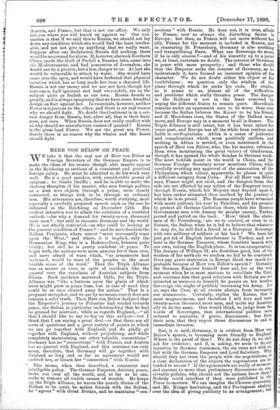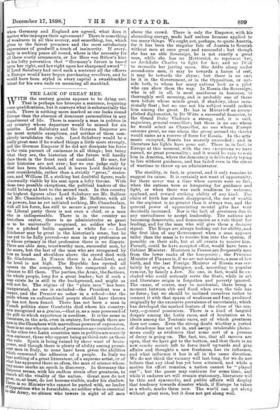HERR VON BULOW ON PEACE.
""liVE take it that the real use of Herr von Billow as Foreign Secretary of the German Empire is to make the ideas of his erratic though able master appear in the Reichstag as sections of a consistent and practical foreign policy. He must be admitted to do his work very well. He is a good speaker, with considerable power of epigram ; he thinks lucidly ; and he is able to make the rushing thoughts of his master, who sees foreign politics as a man sees objects through a prism, seem closely connected, as things look to be through an ordinary lens. His utterances are, therefore, worth studying, more especially a carefully prepared speech such as the one he delivered in the Reichstag on December 12th. His evident intention was to admit the existence of a troubled outlook—else why a demand for twenty-seven thousand more men ?—but still to reassure Germany and the world. He is not wholly contented—as who could be looking at the present condition of France ?—and he sees clouds in the Balkan Peninsula, where unrest "must necessarily react upon the West," and where, it is implied, only the Roumanian King, who is a Hohenzollern, behaves quite wisely ; but still he is pretty confident of peace. To begin with, the nations were more anxious for it than ever, and more afraid of wars which, "as armaments had increased, would be wars of the peoples in the most terrible sense of the word." Then the Triple Alliance was as secure as ever, in spite of incidents like the quarrel over the expulsion of Austrian subjects from Silesia. Such incidents mattered little, for the Triple Alliance was " like a fortress upon the glacis of which trees might grow in peace time, but in case of need they could be at once cleared away for action." That is a pregnant metaphor, and we are by no means sure it does not contain a solid truth. Then Herr von Billow declared that the Emperor's journey to Palestine had tended towards peace, the Sultan in particular understanding that he had no ground for mistrust; while as regards England,—" all that I should like to say to-day on this subject—but I think that I am saying a great deal—is that there are all sorts of questions and a great variety of points in which we can go together with England, and do gladly go together with England, without prejudicing, and while completely maintaining, our other valuable connections." Germany has no " connections " with France, and Austria has no quarrel with England, and this sentence can only mean, therefore, that Germany will go together with England so long and so far as agreement would not embroil her, or loosen her " connection " with Russia.
• This seems, when thus described, a consistent and intelligible policy. The German Emperor, desiring peace, looks out over all the world, and, so far as he can, seeks to remove all visible causes of trouble. He keeps up the Triple Alliance, he warns the unruly States of the Balkan to be quiet, he makes friends with the Sultan, he " agrees " with Great Britain, and he maintains " con- nections " with Russia. He doe not it is true, allude to France, now as always the disturbing factor in Europe ; but then, as France will not move without her ally, France for the moment is included in Russia, and in reassuring St. Petersburg, Germany is also soothing and tranquillising Paris. What can Sovereign do more, if he is only sincere ?—and of his sincerity up to a point we, at least, entertain no doubt. The interest of Germany is peace with more prosperity ; and those who doubt that the Emperor seeks the interest of Germany, as he understands it, have formed an incorrect opinion of his character. We do not doubt either his object or his truthfulness ; we question only the wisdom of the plans through which he seeks his ends. He evades, as it seems to us, almost all of the difficulties and problems which really threaten peace. The danger in the Balkans is not in the least removed by urging the different States to remain quiet. Macedonia remains under an oppression sure to be worse than ever because the Sultan believes the Kaiser to be his friend, and if Macedonia rises, the States of the Balkan must move, and Europe may in a moment be all in flames. The Triple Alliance is still intact, but it has been intact for years past, and Europe has all the while been restless and liable to conflagrations. Africa is a cause of jealousies and complications which seem positively endless, and nothing in Africa is settled, or even mentioned in the speech of Herr von Billow, who, like his master, refrained from even mentioning the great victory of Omdurman, though it has opened the whole Soudan to German trade. The most ticklish point in the world is China, and the German Foreign Secretary never mentions China, while carefully avoiding any approval of the annexation of the Philippines, which colony, apparently, he places in quite a different category from Cuba. For all Herr von Billow says, France might not exist, and the dangers from that side are not affected by any action of the Emperor except through Russia, which, his Majesty may depend upon it, has been rather alienated than soothed by the journey of which he is so proud. The Russian people have witnessed with acute jealousy his tour in Palestine, and his promise to protect all German Catholics there, while the Russian Government sees with dismay its secular enemy, Turkey, petted and patted on the back. ' How,' think the states- men of St. Petersburg, are we to control, or even to in- fluence, the Sultan when he is led to believe that whatever he may do, he will find a friend in a European Sovereign with two millions of soldiers at his back ? We have but just got rid of English interference in Turkey, and now here is the German Emperor, whose frontiers march with our own, taking the English place. It is too exasperating.' The designs of William II. are doubtless good, but of the wisdom of his methods we confess we fail to be convinced. Does any grave statesman in Europe think war much less probable because of Herr von Billow's speech ? Certainly the German Emperor himself does not, for at the very moment when he is most anxious to conciliate the Czar, and convince him that good relations with Britain are not intended as menaces to himself, he passes on his brother Sovereign the slight of publicly increasing his Army. Let us, says the Czar, at all events abstain from increasing our armaments. Certainly, replies the Kaiser, that is most magnanimous, and therefore I will levy and train twenty-seven thousand more men, and incite my Austrian ally to do the same. One would think, to judge from the words of Sovereigns, that international politics were reduced to amicable, if grave, discussions ; but from their acts, that they expect those discussions to end in immediate invasion.
But, it is said, Germany, it is evident from Herr von Billow's speech, is becoming more friendly to England. Where is the proof of that ? We do not deny it, we only ask for evidence ; and if, in asking, we seem to do any injustice to German statesmen, the sin rests not with us, but with the German Emperor and Lord Salisbury. Why should they not trust the people with the negotiations, or a clear declaration of the objects the negotiations are in- tended to secure ? If the agreements are really of moment', and amount to more than preliminary discussions on enn: ceivable policies, why should not the nations know them r Nobody could interfere if they were published in .the Times to-morrow. We can imagine the Chinese quaserTg' and. Mr. Kruger hesitating, and the Portuguese shaking over the idea of giving publicity to an arrangement; but when Germany and England are agreed, what does it matter who impugns their agreement? There is something of weakness in all this secrecy, and something, too, which gives to the fairest promises and the most satisfactory expressions of goodwill a touch of insincerity. If every- body is seeking peace all round, where is the necessity for all these costly armaments, or for Herr von Billow's hint in his lofty peroration that " Germany's future is based upon her right, and her right upon her sharpened sword" ? If Lord Salisbury had used such a sentence all the officers in Europe would have begun purchasing revolvers, and he would have been styled in every capital a swashbuckler intent for his own ends on menacing all mankind.











































 Previous page
Previous page